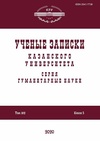Зарубежная библеистика в советской историографии: формирование и эволюция критического нарратива
Western Biblical Studies in Soviet Historiography: Formation and Evolution of the Critical Narrative
Author(s): A. A. PopovaSubject(s): Marxism, Politics and religion, Interwar Period (1920 - 1939), Biblical studies, Sociology of Religion
Published by: Казанский (Приволжский) федеральный университет
Keywords: Soviet historiography; biblical studies; Bible; anti-religious propaganda; religious policy of the USSR;
Summary/Abstract: The critical narrative, which was part of the unified canon of Marxist biblical studies, took shape under the impact of both external (USSR anti-religious policy) and internal (scholarly research, discussions, and polemics) factors. In the 1920s, anti-religious propagandists determined its development. Subsequently, in the late 1930s, it was legitimized in the academic field by the program articles of biblical scholars. Thus, a core of cited and criticized authors was established by the late 1930s, as well as key topics, methods of criticism, and principles of text design. This structure remained practically unchanged until the end of the Soviet era, when the state policy on religion became ambiguous and blurred the anti-religious discourse. Consequently, the unified narrative of Soviet biblical studies began to disintegrate, thereby forcing scholars to look for ways out of it. However, the views held by Soviet biblical scholars soaked the basics of the anti-religious discourse, so it was difficult for them to move away from the long-standing patterns. For this reason, they only tried to bring a fresh perspective to their reasoning: they avoided giving direct answers to the basic questions of biblical scholarship and changed the tone of criticism toward western authors or refused it. At the end of the Soviet era, most biblical scholars rejected the outdated and tendentious ideas of Marxism, but they still addressed almost the same scope of issues, partly the elements of Marxist methodology and terminology as its integral part.
Journal: Ученые записки Казанского университета. Серия Гуманитарные науки
- Issue Year: 164/2022
- Issue No: 6
- Page Range: 81-94
- Page Count: 14
- Language: Russian

